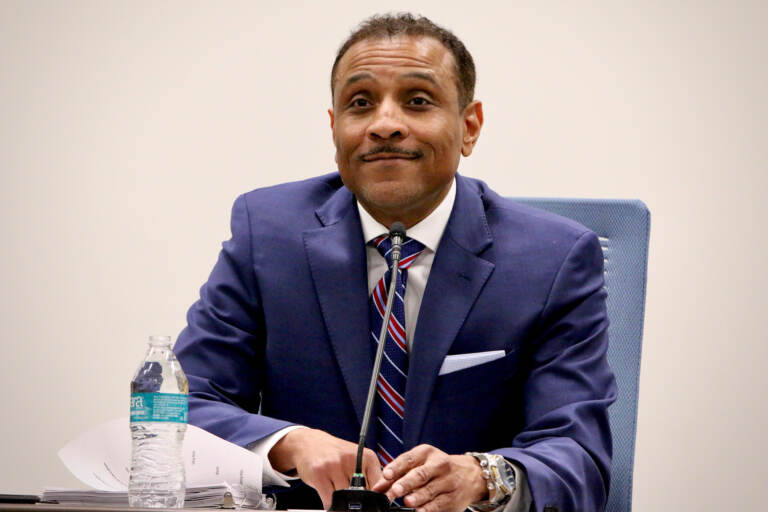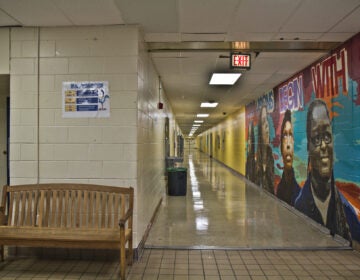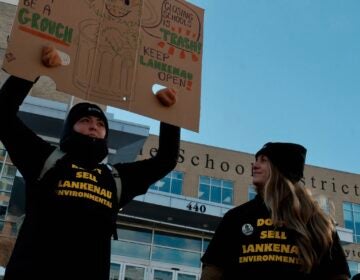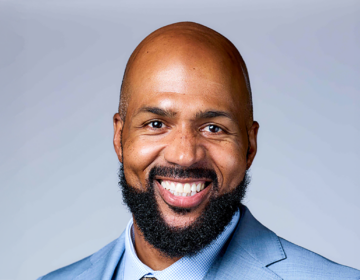Well-liked…but is he well-tested? The backstory of Philly’s new superintendent
Philadelphia’s new school leader impressed at his old job in North Carolina. But his superintendent resume is thin. How will it translate to Philly?
Listen 5:56
File photo: Tony Watlington Sr., superintendent of Rowan-Salisbury Schools in North Carolina, meets with parents and guardians at Philadelphia school district headquarters. Watlington is one of three candidates for the superintendent of schools job. (Emma Lee/WHYY)
Science teacher Rena Taylor was head of the teachers’ union in the Rowan-Salisbury School District when Tony Watlington took over, in January 2021.
She was nervous.
The last superintendent left unexpectedly, partway through the school year. Everyone was grappling with COVID, and things felt tumultuous, Taylor said.
Rowan-Salisbury also works differently than every other district in North Carolina. It’s the state’s only renewal district. All schools have the kind of flexibility typically reserved for charters, with decision making power around curriculum, hiring, the calendar and budget.
“It’s a unique situation in our district that requires a lot of leadership,” Taylor said.
Her nerves calmed, though, as she got to know Watlington.
“I’ve had nothing but a positive experience with him,” she said. “I think everyone is sort of wowed by his charisma and commitment to community.”
In Philadelphia it’s almost impossible to imagine — a union leader with glowing reviews of her district’s superintendent. But that’s the feedback many in North Carolina offered for Watlington. In years as an educator — and a short stint as a district leader — he gained a lot of fans.
The question now: Will it translate to a far larger district with a history of bruising political battles over public education?
We’re about to find out. On Thursday, the Philadelphia Board of Education signed off on a five-year contract that will pay Watlington $340,000 annually to lead the School District of Philadelphia. He starts June 16.
At the very least, it seems Watlington is the type to give conciliation and cooperation a try.
Watlington met regularly with Taylor’s group, “to get a read from our members about what they needed,” and attended a special union event that honored teachers, students, and cafeteria workers, even though he “definitely didn’t have to.”
North Carolina is a right-to-work state, where unions don’t have collective bargaining power, making his outreach efforts particularly notable.
Taylor liked that he kept his teaching license current — a sign that he is “keeping himself in touch with his roots and with his teacher constitutions” — and she was impressed with the way he developed a five-year strategic plan for the district.
Taylor was part of the Strategic Planning Committee, and said Watlington brought many different voices to the table, including students and teachers. He incorporated their feedback into the plan, and didn’t just pay lip service to community engagement.
One example: students talked at length about how their mental health affects their ability to learn, and “student wellness and engagement” became one of the key focus areas in the report, with a clear framework for supporting children.
“He was super, super good at marrying people together … that you might not ordinarily expect to reach a consensus,” Taylor said.
From custodian to administrator
Watlington came to the district from Guilford County Schools, where he spent most of his career. It’s the third-largest district in North Carolina, serving around 72,000 students.
He started his school career as a bus driver and custodian and became a history teacher at James B. Dudley High School in 1994. Within a few years, Watlington was named teacher of the year for his district. He later rose through the ranks to become a principal and central office staffer, ultimately serving as chief of schools or second-in-command.
During community meetings in Philadelphia, Watlington described himself as a “free-and-reduced lunch child” whose life was shaped by strong schools and good teachers. He was the first in his family to graduate college.
“I know the promise of a great education,” Watlington said during a parent roundtable in Philadelphia. “I know how to work with people at all levels of this organization.”
Jimmi Williams is executive director of Communities in Schools of Greater Greensboro and worked alongside Watlington for decades. His nonprofit helps connect schools with community resources.
“One of the things I’ve always loved about Tony is he has got to be one of the most decent human beings I’ve ever met,” Williams said. “I have worked with five superintendents, and I know that that is not always the case, where you can say emphatically that one of the most distinguishing characteristics of that person is that they are incredibly decent and embracing.”
Williams said Watlington was an exceptional classroom teacher and school leader, and that he understands the role of community support in schools.
“That may seem like a very mundane kind of thing to say, but school folk don’t always welcome community support and assistance,” Williams said, “and he has a natural grasp on that.
When Watlington became a principal, he realized a group of overage students in his school was struggling academically, Williams recalled.
They ended up developing a special academic program for those students at a local university, Williams said. That later became a model for the district’s Early/Middle Colleges, which serve students whose needs aren’t met in traditional school settings.
Watlington eventually served as principal at one of those high schools.
“I watched him skillfully empower his students to overcome things that many students did not have the opportunity to address in an academic setting and find success,” said Kenya Donaldson, head of the teachers union in Guilford County.
She first met him when she was a principal intern, and had a chance to shadow him at the Early/Middle College at GTCC-Jamestown.
She described him as a meticulous leader who pays close attention to detail, and said he quickly became one of her role models.
“His ability not only to listen actively to stakeholders – from parents to teachers to students – and being able to guide them in resolving conflict or problem solving and innovating around an issue really left a lasting impression,” Donaldson said.
Will it translate to Philly?
But the move to Philadelphia is a big jump for Watlington. He doesn’t have a long track record as a superintendent, having only led Rowan-Salisbury Schools for a little over a year.
Student growth went up during his first year in charge, but he only took over partway through the school year. Simply put, there isn’t a lot of data to measure his impact as the first-in-command of a school district.
Watlington is leaving a district of less than 20,000 students for one about ten times that size, in the poorest big city in the nation. He’s also moving from a right-to-work state to a strong union town.
During his visit to Philadelphia last month, Watlington acknowledged that he faces a steep learning curve. He said he is not “Pollyanna-ish or naive” about the challenges that come with leading a much larger district, but he believes “good teaching is scalable, good practices are scalable.”
Williams, the non-profit leader in Guilford County, believes Watlington has the “capacity and the wherewithal” to lead the district.
“I worry, quite frankly, most about the politics,” Williams said. “What is he going to need to do as a member of the community — both the school community and the [overall] community — to get the job done above and beyond just his knowledge of school districts, his vision, his expertise in terms of teaching, etcetera.”
It will be “quite the jump” from his previous experience, Williams said. “But I’ll tell you, he is a very confident young man. I don’t think that he would have chosen [this job] if he had any doubt about his ability.”
Major challenges loom
Watlington will take over Philadelphia schools during a difficult time. There are persistent problems, like dilapidated school buildings — some that have issues with lead or asbestos. Academic struggles were exacerbated by the pandemic, and low teacher morale has led to a mid-year surge in resignations. School communities are also reeling from historic levels of gun violence.
“I think greater than a crisis of resources, Dr. Watlington faces a crisis of faith in the public school system,” said City Councilmember Helen Gym, a longtime education activist. “My hope is that his top priority is to really go out there and understand what the perspective is from teachers — why they are leaving the system. It’s about how to re-engage students and their families, to bring them back into public schools that we feel should be more vibrant, more supportive, more loving, more caring than ever before.”
Watlington said he plans to start his time in Philadelphia with a learning and listening tour, to get a fuller grasp of the issues.
When visiting the city as a finalist for the top education job, he said his long-term vision is for the district to become a “national beacon of hope, that shining city on the hill that says, ‘This is how a majority Black and brown school district ensures that all students understand and experience what academic excellence looks like.’”
The exact details of how that will happen remain to be seen. Watlington didn’t strike an overtly ideological tone in his public comments.
But Kenya Donaldson, who leads the teachers union in Guilford County, thinks he’s up to the challenge. She says he was a source of stability for the district, and she hoped he would return someday as superintendent.
When she and her colleagues heard he was taking the top job in Philadelphia, “there was a little bit of a moan here. ‘Like, ‘ahh he’s leaving us, that means he’s not coming back to Guilford,’” she said.
“Our loss is your blessing.”

Saturdays just got more interesting.
WHYY is your source for fact-based, in-depth journalism and information. As a nonprofit organization, we rely on financial support from readers like you. Please give today.









